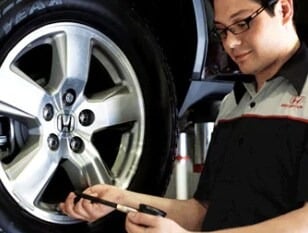Frequently Asked Questions
Why balance and align my wheels?
Regular alignment, rotation, and balancing help prevent uneven tire wear saving fuel and the cost of early replacement of tires and suspension parts. Your vehicle will handle correctly during emergency maneuvers, steer straight without pulling and have fewer vibrations.

Why are my windows fogged up in winter?
Do not use the recirculate button on the heater in winter. Use fresh only. Recirculate blows wet air from the floor onto windows and roof where it condenses. Keep fan speed high, turn only the temperature down not fan speed when vehicle heats up to help dry interior. Keeping air circulating is key to drying interior.

How often should I check my tire pressure?
Tire pressures (like oil levels) should be checked every time the vehicle is fueled up or at least once a month. Low pressure increases fuel consumption, wears tires faster, and decreases handling. Remember from science class that pressures will drop when the temperature goes down, so checking regularly in the fall is important. You can stop by our service department and have your pressures checked for free any time we are open.

Should I have a set of Winter tires as well?
The best way of thinking about the differences between a winter tire and an all-season tire is to take a look at your footwear. Most would not venture out on to a snow-covered sidewalk wearing leathersoled dress shoes, but that's exactly what happens when the car is driven while "wearing" all-season tires. The all season tire was designed as a single replacement to avoid the expense of having both summer and winter tires. An all season tire is designed mostly for wet and dry driving on pavement with occasional snow. Canadian winters require snow tires that were especially designed for slippery conditions and very cold temperatures.
On a snowy road, a vehicle wearing winter tires has a 38 per cent less chance of being involved in a collision than a vehicle wearing all-season tires. The fact that the winter tire's stopping distance is around 40 per cent shorter than an all-season tire under the same conditions probably has a lot to do with it.
It's a good idea to buy an extra set of rims for your winter tires. This will make it much simpler, faster, and less expensive to change the tires over between winter and summer.

Premium or Regular fuel?
The reason some cars ask for premium gas is because they have a high compression engine and won't run on regular. Fuel economy and power will be reduced and damage can occur when using regular fuel in a vehicle that requires premium gas.
If your car does not require premium gas, there are no added benefits to your car's performance or longevity, you're paying 10 - 15 cents more a liter for something you don't need. It won't make your car perform better, go faster, get better mileage or run cleaner and it can lead to loss of performance and heavy carbon deposits.

What's the advantage of a turbocharger?
The fuel consumption of a turbocharged engine is lower, the installation space requirement is smaller, and the power-to-weight ratio is much better than that of the naturally aspirated engine with the same power output. The high-altitude performance of a turbocharged engine is significantly better.
A turbocharged engine's torque characteristics are also better. Due to a very high torque increase close to full power output is maintained at midrange RPM's. Therefore, climbing a hill requires fewer gear changes and speed loss is lower. A turbo four-cylinder engine has the power of a six-cylinder and better fuel mileage than a naturally aspirated four.
Honda turbocharger
Have any more questions? Phone or come into Alberta Honda today and talk to our knowledgeable service staff!

